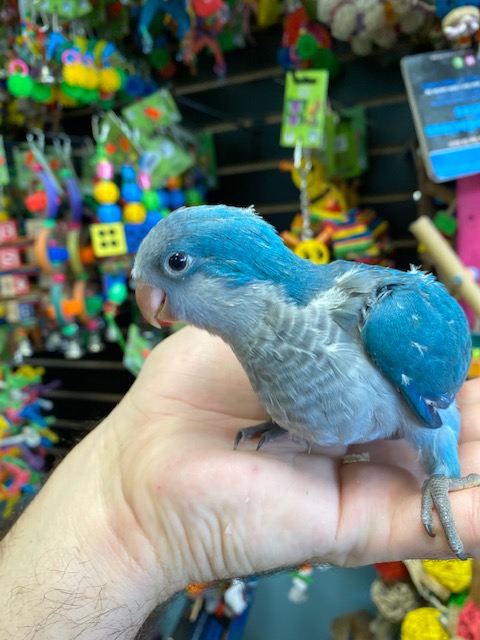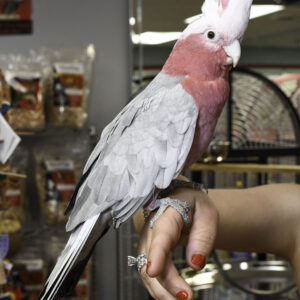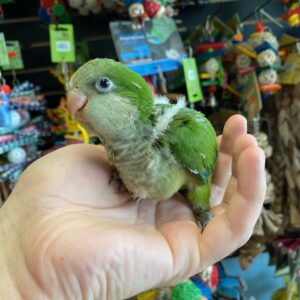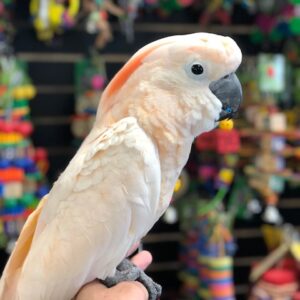Description
Blue quaker parrot near me
Currently hand feeding sweet baby Blue Quaker Parrots, these species are very sweet and cuddly and can talk well if taught. Buy blue quaker parrot near me
blue quaker parrots for sale. Quakers love their toys and will approach a newly introduced toy much sooner than the average bird.
Beautiful blue quaker parrot near me online
Blue Monk Parakeets are a desired bird for avian enthusiasts. This gregarious species often breeds colonially, building a single large nest with separate entrances for each pair. Monk parakeets are highly intelligent, social birds. Those kept as pets routinely develop vocabularies of scores of words and phrases. Quakers love their toys and will approach a newly introduced toy much sooner than the average bird.
Geography: The Quaker Parrot or Monk Parakeet originates from the temperate to subtropical areas of Argentina, Central Bolivia, southern Brazil and the surrounding countries in South America. Self-sustaining feral populations occur in many places, mainly in North America and Europe. Quakers love their toys and will approach a newly introduced toy much sooner than the average bird.
Song / Call: Click to hear the Quaker Parrot / Monk Parakeet
Size: 11″ long, 10″ wingspan, weighs 3.5 oz.
Life Span: 25-30 years
However, they do become bored quickly and enjoy a frequent change in toys.
Sexing: Monomorphic (visually hard to determine sex). DNA testing is available to ensure desired gender.
Temperament: Playful, cheeky, inquisitive, excellent talkers are just some ways to describe these brilliant birds. Socialization
and interaction form an important part of the Quaker Parrots daily routine.
This positive training approach should be used to overcome the domineering behaviour that some Quaker parrots may exhibit. They should not be confined to the cage as this may lead to behavioral problems.
Physically, the Quaker Parrot is a hardy bird and is able to tolerate cold temperatures well. Quakers are active, inquisitive, mischievous, intelligent, playful, and engaging parrots. Their antics are a constant delight to their owners.
They are completely devoted, bonding closely with their human owners.
Quakers love their toys and will approach a newly introduced toy much sooner than the average bird.
However, they do become bored quickly and enjoy a frequent change in toys. They are also very “mechanically inclined” – being able to figure out most cage locks in no time, and disassembling toys with ease.
Quaker Parakeets are usually very vocal and capable talkers, singing songs and picking up extensive vocabularies. Most Quaker Parrots learn to talk at about six months, speaking quite clearly and using their skills most appropriately. They can entertain themselves for hours chirping, whistling and practicing human vocalizations.
However, they do become bored quickly and enjoy a frequent change in toys. They are also very “mechanically inclined” – being able to figure out most cage locks in no time, and disassembling toys with ease.
Breeding:
Quaker Parrots don’t only build their own nests using twigs and other plant material,
Quakers love their toys and will approach a newly introduced toy much sooner than the average bird.
with individual chambers and separate nest entrances for each pay.
These nesting structures can be the size of a small automobile and weigh 200 lbs (91 kg) or more.
Quaker Parrots often breed in colonies, building single large nests with separate entrances for each pair. The nests are construct out of sticks situat in trees or on man-made structures,
light poles and electrical utility poles. The exception is the Cliff Parakeets which nests in cliff crevices. Quaker Parrot pairs may have “helper birds” that assist with feeding the chicks – often they are their grown offspring.
If there is no gender option list for a bird on our website, that particular species is ‘monomorphic’,
However, they do become bored quickly and enjoy a frequent change in toys.
which means we’re unable to determine gender without purchasing DNA testing. DNA testing is an additional $149 per bird to guarantee preferred gender. DNA testing may add an additional 3-6 plus weeks to estimated delivery time to allow for gender results. blue quaker parrot for sale
However, they do become bored quickly and enjoy a frequent change in toys.




